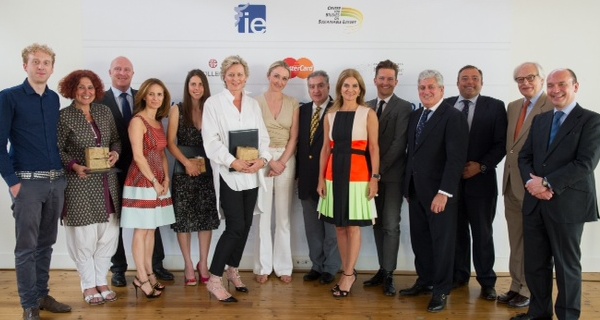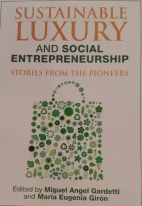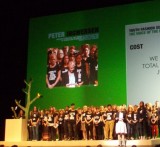On the 3rd of July 2014, IE Business School presented its Awards for Sustainability in the Premium and Luxury Sector in a ceremony held in its Paper Pavilion, designed by architect Shigeru Ban (2014 Pritzker Prize). The main objective of the awards, which went to LOEWE, Elvis & KRESSE, SONEVA, Spazio Sumampa, and DANISH INSTITUTE FASHION, is to recognize the culture and practice of sustainability in the premium and luxury sector.
IE Business School and Argentina’s Foundation for Higher Education and Research joined forces to create the prizes, which are of an exclusively social and cultural nature, and are aimed at recognizing best sales practices, and strategies and innovations in areas related to sustainability in the luxury and premium sector.
The prizes are divided into three categories. Given that on this occasion none of the candidates met the requirements for the watch and jewelry category, prizes were only awarded in the remaining two categories, namely Fashion and Accessories, and Hospitality. The winners were:
- In the Fashion and Accessories category the winner was UK company Elvis & Kresse. The firm makes all its pieces using waste materials from the London Fire Brigade, particularly old hoses.
- In the Hospitality category, the winner was Soneva, a luxury resort chain which is a pioneer in sustainability in its battle against climate change. Its hotels, in the Maldives and Thailand are designed to “decarbonize” the atmosphere by absorbing carbon dioxide instead of producing it.
In addition to these two prizes, there were three honorary recognitions of consolidated firms:
- Danish Fashion Institute (DAFI), was recognized for its capacity for dissemination, given that it promotes the need to integrate sustainability and social responsibility in the world of fashion through international events like the Copenhagen Fashion Week.
- Spazio Sumampa, was recognized for its contribution to sustainable luxury in Latin America, helping to generate sustainable income that is also sufficient to live on for women in the province of Santiago del Estero (Argentina), through the diffusion of ancestral textile art that is of great historical and cultural value.
- Spanish firm Loewe, was recognized for its long trajectory, having distributed traditional Spanish craftsmanship since 1846, and for the efforts it has made to preserve traditional leatherworking crafts by including them in each step of its production process. Its responsible and sustainable approach is recorded in a sustainability report which details the processes, the people involved, and the results.
In this first edition the awards were presented at the IE Business School campus, in its Paper Pavilion, designed by architect Shigeru Ban. Alexandra Cousteau, granddaughter of French oceanographer Jacques-Yves Cousteau, served as master of ceremonies. Ms. Cousteau is a champion of the environment and sustainable management practices for aquatic resources, an ambassador of OCEANA. The opening remarks were made by Santiago Íñiguez, President of IE University and Dean of IE Business School, accompanied by María Eugenia Girón, Director of the IE and MasterCard Observatory on the Premium Market and Prestige Products and Executive Director of the Awards, and Miguel Ángel Gardetti, Director of Argentina’s Center for Studies on Sustainable Luxury and President and founder of the Prize for Sustainable Luxury.
Mónica Chao, Environmental and Sustainability Corporate Manager at NH GROUP, presented the award to Kreese Wesling, founder of Elvis & Kreese; Enrique Valero, General Director of Abadía Retuerta LeDomaine, presented the award to ARNFINN OINES of Soneva; Ovidio Egido, General Director of MasterCard, presented the prize to JOHAN ARNO KRYGER of Danish Institute Fashion; Miguel Ángel Gardetti, Director of IESC and Founder and Director of the IE Awards on Sustainable Luxury, presented the prize to Claudia Mazzola of Spazio Sumampa; while Santiago Íñiguez, President of IE University and Dean of IE Business School presented the prize to Lisa Montague, CEO of LOEWE.
María Eugenia Girón talked about what the prizes are designed to recognize: “Sustainable luxury means a return to true luxury, to products made to last forever by people who made their mark when they strived to create them. That is the essence of a luxury product. These prizes recognize the companies that have always understood luxury this way. They are also aimed at entrepreneurs who launch projects with the conviction that today, the world has no need of brands that do not serve to make it a better place.”
The honorary prizes are awarded in the spirit of the initiative, which, as founder Miguel Ángel Gardetti says, “are not only a way to gain greater respect for the environment and social development, but should also be synonymous with culture, art and innovation in different countries, and with maintaining the legacy of local craft.”
Click here to visit the award's website.
*in the picture above: all the awarded, the awards' directors and members of the jury. First on the right, Santiago Íñiguez de Ozoño, President of IE University and Dean of IE Business School in Madrid. |




